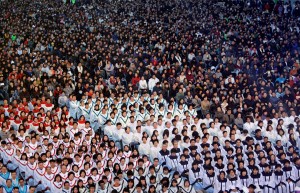Following three forum threads and reading two articles from Ludwig von Mises Institute, I came up with different answers explaining the phenomenal growth of South Korea’s economy. The answers I received are due to government leadership, collaboration between the government and the chaebols, intervention of the US, an ongoing experiment between socialism and free market, and the chaebols using the government.
Coming from theological education, I am not satisfied with the above answers. I am looking for a connection between the growth of Christianity in South Korea and her economic development. And I find Kirsteen Kim’s paper, “Christianity and modernization in twentieth-century Korea: perspectives on new religious movements and the revitalization of society” helpful. The paper primarily focused on Protestant Christianity’s impact on Korea’s national development. And national development is incomprehensible apart from a robust national economy.
Kim is critical of developmental theory that left out the significant role of religion. Basing on the works of Scott M. Thomas, Kim claims that religion actually played a vital role in social development. The assumptions therefore of developmental theories leaving out religion are inaccurate. Those theories stigmatize religion as primitive, confined in institutional concepts and beliefs, and a matter of personal preference. Those theories fail to see the public importance of religion as a force to create change in the lives of people, the economy, and the entire society.
Kim identifies ten ways Protestant Christianity has impacted the country:
- Holistic view of life
- Developmental approach
- Transforming socio-cultural practices
- Correlation between Christianity and independence movement
- Church gatherings as avenues for resistance
- Witnessing through various social services.
- Influence of the corporate world in the way church leaders manage church ministries
- The development of Minjung theology
- Reunification of two Koreas as a concrete application of biblical Jubilee.
- Global mission
Protestantism shares the holistic view of life with Catholicism. Both of them offered vision of a better life than the one given by both Confucianism and Buddhism. This vision of a better life goes beyond “spiritual’ concerns such as the salvation of soul. Christianity during its early stage in South Korea was understood as a force for change affecting family and the society. It has power to solve political and economic problems. It is actually understood as an important component in nationalism. It even serves as an economic motivation for it provides a way to protect the living standard of the people and Christian connection offers diverse economic advantages.
The concrete application of establishing the kingdom of God through developmental approach is the second way Christianity impacted South Korea. Early Protestant missionaries established schools, hospitals, and churches. Through the influence of Nevius method, church leadership was nationalized and democratized. Consequently, Korean Christians were quick to imitate the example of Protestant missionaries resulting to the multiplication of schools, hospitals, and churches throughout the country. In fact, as of 2002, among the top five universities in the country, the roots of three of them could be traced in Christian tradition.
Socio-cultural practices especially related to gender and age underwent change through the influence of Christianity. Superstitious beliefs collapsed, domestic abuses were exposed, and Korean Christians developed a “social consciousness” resulting from emphasis on education.
The role of Christian leaders and churches in the nationalist and independence movement was the fourth way Christianity influenced the development of South Korea. Historically, Christians suffered a lot for their active participation in this independence movement.
Due to Japanese suppression, early Korean Christians found prayer and revival meetings as ways to resist Japanese cultural imposition. However, when the colonial government made Shinto worship compulsory in schools, resistance became public, which resulted to persecution, imprisonment, and death. Church buildings were even closed down.
Church ministries in South Korea have been managed like the corporate world. They invest on impressive buildings and cutting edge technology. Church leaders never criticize capitalism. In fact, the growth of Korean churches is closely associated with the growth of businesses.
Minjung theology consists of three threads: Catholicism’s liberation theology, insights of folk history movement of the 1960s, and re-reading of the Bible from economic and political perspectives. Minjung theologians played a significant role in the overthrow of Korea’s military government. They displayed openness to collaborate with other groups advocating the protection of human rights.
I find that there is no need for further elaboration on the sixth and the last two influences of Christianity – witnessing through various social services, reunification of North and South Korea, and missionary work around the world.
Based on Kim’s paper, it is now clear that Christianity indeed played a significant role in the national development of South Korea. And part of that development, I suggest that the economic boom of the country could never be explained completely apart from the religious influence coming from Christianity.
Source: Kirsteen Kim

No comments:
Post a Comment